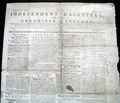Home > Back to Search Results >
Abbé Raynal's address to America... John Adams & Thomas Jefferson as ambassadors...
Abbé Raynal's address to America... John Adams & Thomas Jefferson as ambassadors...
Item # 711119
Currently Unavailable. Contact us if you would like to be placed on a want list or to be notified if a similar item is available.
July 30, 1785
THE INDEPENDENT GAZETTEEER, OR THE CHRONICLE OF FREEDOM, Philadelphia, July 30, 1785
* The Abbé Guillaume-Thomas Raynal
* Revolutionary War "Address to America"
Perhaps the most noteworthy content is Multiple sources say his Abbé Raynal's address to America, noteworthy warning/plea was first printed posthumously in 1800, however, its presence within this newspaper proves otherwise. A nice find.
Page 2 has a notice from London that: "This day John Adams, Esquire, Minister Plenipotentiary from the United States of America, had a private audience of his Majesty to deliver his credentials...". Also page 3 mentions: "Colonel [Thomas] Jefferson, Minister Plenipotentiary from the United States of North America, to the French Court, is arrived at Paris & had a private audience with the King..." with more.
Four pages, never bound nor trimmed, various wear at the folds causes some breaks, discrete archival mends at folds, light dirtiness to the front page.
AI notes: The Abbé Guillaume-Thomas Raynal, the French Enlightenment thinker best known for his multi-volume Histoire philosophique et politique des établissements et du commerce des Européens dans les deux Indes (1770–1780), became an influential voice in the Age of Revolution. In 1782, amid the American Revolutionary War, Raynal issued his famous “Address to America”, which was widely circulated in pamphlet form and translated into English. In this address, he celebrated the new United States as the first nation to embody Enlightenment ideals of liberty, justice, and popular sovereignty. He hailed America’s break from monarchy as a historic rupture with the Old World’s corruption, but he also cautioned the republic against arrogance, factionalism, or betraying its principles. Specifically, Raynal urged Americans to abolish slavery and to ensure that freedom was extended universally, warning that hypocrisy would undermine the legitimacy of their revolution. His words resonated strongly with European intellectuals and reformers, positioning America as a “beacon” of liberty while holding it morally accountable to Enlightenment ideals.
Category: The 1600's and 1700's


















